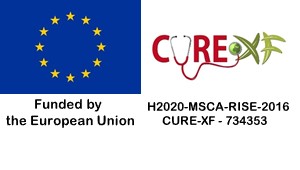“CURE-XF” is funded by H2020 (Marie Skłodowska-Curie Actions (MSCA) Research and Innovation Staff Exchange (RISE) Call: H2020-MSCA-RISE-2016). Project number: 734353
Project duration: 1 September 2017 – 31 August 2021
CURE-XF involves 18 partners from the following countries: Italy, France, Greece, Spain, Belgium, UK, Egypt, Morocco, Tunisia, Lebanon, Palestine and Iran.
In this project the different aspects of Xylella fastidiosa assessment and management (pathogen-hosts interaction, characterization, diagnosis, epidemiology, monitoring, etc) are tackled.
The objectives of CURE-XF are:
- To exchange the scientific capacities and novelties among the European Countries as well as between EU and third countries, in particular sensitive neighbor countries.
- To strengthen the knowledge and the know-how on Xf in third countries having intense exchange of plant material with Europe.
- To raise awareness in relation to Xf impacts and risks upon its establishment
The specific objectives of CURE-XF are:
- Strengthen preventive measures by consolidating expertise and awareness of plant health agencies, decision-makers and relevant stakeholders.
- Implement the knowledge on the Mediterranean crops and host species threatened by the further spread of Xf.
- Promote the use of advanced diagnostic tools for the detection and characterization of Xf and associated vectors.
- Consolidate innovative approaches for disease prevention, monitoring and control of Xf and associated vectors.
- Improving pest risk analysis, phytosanitary legislations and contingency measures for a safe plant material trade.
- Integrate with current platforms for adequate communication and dissemination ensuring an effective knowledge transfer among the various actors involved.

Methodology
The project involves partners from the following countries: Italy, France, Greece, Spain, Belgium, UK, Egypt, Morocco, Tunisia, Lebanon, Palestine and Iran.
Partner countries selected are differently involved in the study and management of quarantine pests, although each one with a different role, approach and competence.
These countries can be divided into two groups:
Group 1: countries where the disease is already present (Italy, France, Iran);
Group 2: countries where the disease is currently absent, but the risk of its introduction is high (Spain, Greece, Belgium, UK, Egypt, Tunisia, Morocco, Lebanon and Palestine).
In this project the different aspects of Xf assessment and management (pathogen-hosts interaction, characterization, diagnosis, epidemiology, monitoring, etc) will be analyzed directly in the Group 1-countries (case studies), involving expertise from both groups of countries.



